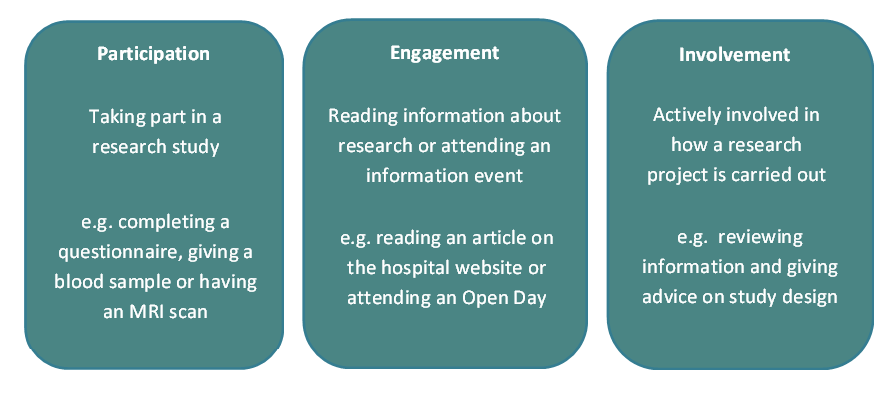What does it mean to be involved in research?
Research involvement is often mistaken for participation or engagement. The image below shows the difference:

Why do we involve patients and the public?
Patients and the public have an important and unique perspective that can be extremely valuable to research studies.
- Patients or carers can bring their knowledge and experience to help inform research about a specific condition. This will help researchers understand what it is like to live and manage a particular condition day-in and day-out. For example, a patient can discuss how a proposed trial might fit in with their existing medical commitments.
- A member of the public can bring their knowledge and experience to help inform research about specific groups of people. For example, a research team developing an App might discuss with teenagers how they use their smartphones and what might encourage them to use a medical app.
Who can get involved?
Anyone can get involved in research. We need people from all walks of life to get involved so that we have different groups of people represented in our research.
- People who use, or have used, health or social care services
- Informal (unpaid) and paid carers
- Members of the general public
- Organisations who represent patients and users
- Patient support groups
- Charities that represent specific health conditions
- Individuals with an interest in the topic being researched
What does it involve?
The ways in which patients and the public are involved vary. You might be invited to a meeting, asked to give your opinions over email/telephone or answer a survey online. Some opportunities require an ongoing regular commitment, while others might require a one-off small time commitment. Here are some examples:
- Helping write or comment on information sheets for patients.
- Help us to solve issues researchers come across in studies.
- Working with a research team to ensure a study is suitable for the patients involved.
- Advise researchers on how to talk about, or write about, research findings in a way that is easy to understand.
- Guide researchers on how to design questionnaires to get reliable, honest replies from people taking part in trials.
- Join a committee for a study, which meet regularly to talk about progress on the project and help make important decisions.
How to get involved?
- To get involved with your local Clinical Research Facility, please email [email protected] and we will put you in touch with your local contact, who will be happy to answer any questions and let you know of local opportunities.
- The People in research website is a great way for you to sign up for opportunities for getting involved in research.
- The NIHR website has lots of useful for patients, carers and the public who want information about getting involved in research. In addition, the Learning for Involvement website brings together resources and training that support public involvement in health and social care research, helping people to understand what it’s all about and how to do it well.
- GenerationR have groups across the UK that support young people’s involvement in research.
- Become a Research Champion, someone who promotes health research from a patient point of view and helps communicate the value of being involved in research to other patients and the public.




